When I first started exploring artificial intelligence (AI) tools, I was overwhelmed by all the technical jargon and complex explanations. However, I knew there had to be a simpler way to understand and use AI without getting lost in the technical details.
What I’ve discovered is that AI can be incredibly powerful for small businesses – but only if you know which tools actually matter and how to use them practically. 💡
Through testing dozens of AI solutions, I have identified the approaches that truly work for small business operations.
In this straightforward guide, I will break down AI in simple terms that make sense for small business owners. No technical jargon, no complicated concepts – just practical ways to use AI to grow your business and save time.
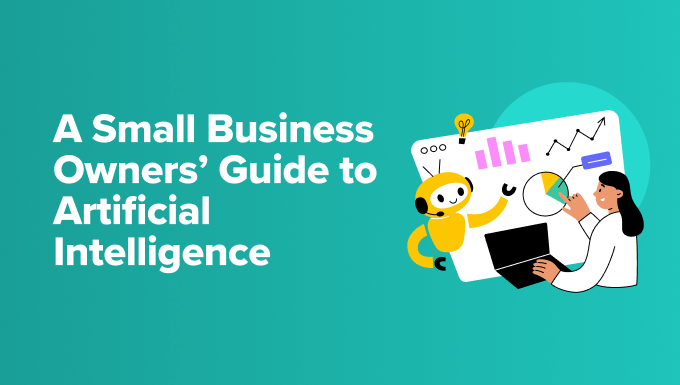

How AI Can Transform Small Businesses
Running a small business means wearing many hats. You have to handle marketing, customer service, sales, and operations all at the same time.
It can feel overwhelming, but AI is here to help.
Instead of replacing jobs, AI acts like an extra set of hands, taking care of repetitive tasks so you can focus on what matters most.
Here’s how AI can make your daily work easier:
- Saves Time and Increases Efficiency: AI can handle repetitive tasks like email responses, appointment scheduling, and data entry. That is why over 40% of small businesses use AI to automate tasks. It frees up time so you can focus on your business.
- Better Business Insights: You can use AI to analyze data, view trends, and make smarter decisions.
- Improves Customer Experience: According to statistics, around 56% of businesses use AI for customer service. AI chatbots can give instant responses, while smart recommendations personalize the shopping experience. Happier customers mean repeat business.
- Reduces Costs: AI automates operations. Fewer manual tasks mean lower costs and higher profits. In fact, small businesses can potentially save up to $35,000 per year by using AI.
- Boosts Sales and Marketing: AI tools can help you optimize ad targeting, generate content, and analyze customer behavior. This enables you to attract the right audience and convert more leads.
- Improves Security: Popular AI tools can detect unusual patterns, helping you prevent fraud and protect customer data. This keeps your business and customers safe.
As a small business owner, you must remember that AI isn’t here to replace you—it’s here to help. The right tools can save you time, cut costs, and grow your business faster.
Having said that, let’s look at a few powerful ways to use AI for your small businesses:
Powerful Ways to Use AI in Your Small Business
Running a small business is like managing a busy restaurant. You’re taking orders, serving customers, handling the books, and keeping everything running smoothly. AI acts like a reliable sous-chef, handling repetitive tasks, analyzing data, and keeping things efficient.
It won’t take over your business, but it will free up your time so you can focus on what really matters. Let’s look at some of the best ways AI can help your small business:
1. AI for Customer Service & Communication 🤖


Good communication is the heart of any successful business. With AI, you can respond faster, give 24/7 support, and even personalize messages for your customers.
For instance, AI chatbots can handle common customer questions, freeing you up to focus on more important tasks. They can answer questions like ‘Do you offer free shipping?’ or ‘How do I reset my password?’ instantly, without you having to type a response.
You can use a tool like Chatbot.com to answer FAQs, help customers find products, and even schedule appointments.
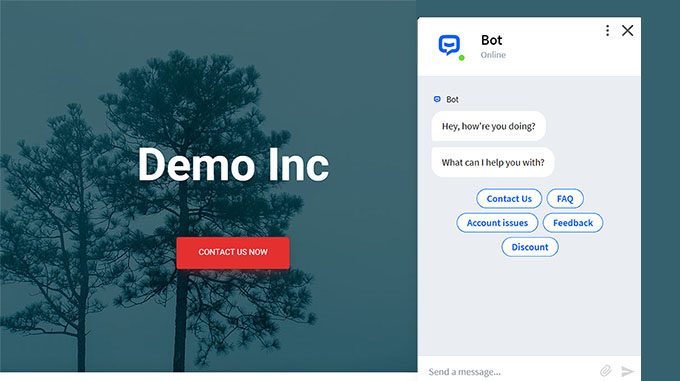

It also integrates with social media platforms like Facebook Messenger, so your bot can instantly respond to customer inquiries, even when you’re offline.
To learn how to do this, just see our tutorial on how to add a chatbot in WordPress.
I also recommend using an AI-powered business phone service to power your customer and team communication. This can help you respond to customers faster, better understand users, and improve your overall customer service.
For example, we use Nextiva across our business, and it comes with AI-powered features like call analytics, automated call transcriptions, and real-time suggestions to call agents.
For more recommendations of AI-friendly phone systems, just see our list of the best business phone services.
Other than that, AI can really level up your email game, especially when it comes to writing professional, personalized messages at scale.
At WPBeginner, our writers often use tools like ChatGPT and Gemini to draft engaging email newsletters. It helps speed up the process while still keeping that friendly, human tone our audience appreciates.


💡 Want to try it yourself? Check out our ChatGPT prompts for marketers to get a head start on writing emails, subject lines, follow-ups, and more.
For more details on how to get started, see our beginner’s guide on how to use AI for customer service.
2. AI for Marketing & Social Media 📱


Creating engaging content on your business website and posting on social media are necessary for reaching people online, but these tasks can take up a lot of your time. Luckily, AI can help by generating written and visual content, suggesting the best times to post, and optimizing your content for SEO.
For example, AI writing assistants can help businesses create blog posts, social media captions, and product descriptions in minutes.
I personally use All in One SEO for content generation because of its built-in SEO title and meta description generator that uses AI to help create optimized titles and descriptions quickly.
To get started, just see our tutorial on how to write powerful headlines using AI.
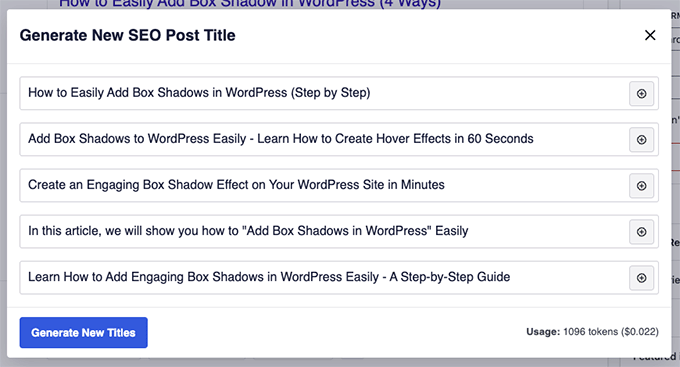

AIOSEO also includes a Link Assistant feature with built-in AI capabilities. It scans your site for internal link opportunities, suggests relevant anchor text, and even lets you add links in bulk without manually editing each post.
I have discussed this in greater detail in our tutorial on how to use AI for SEO.
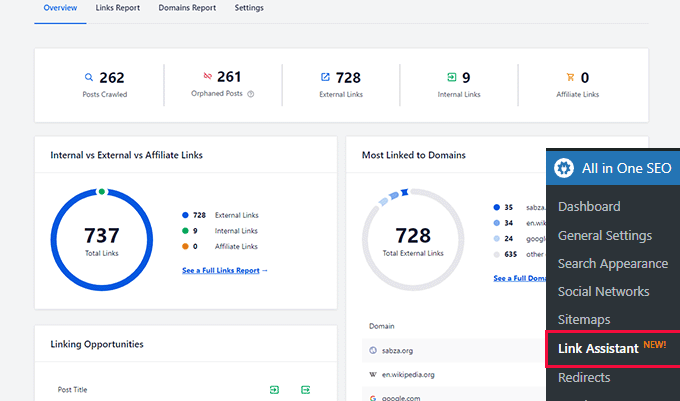

But if you need visuals for your social media content, then I recommend Canva AI. It can generate images and short videos for your marketing campaigns, making your content more engaging.
AI also simplifies social media management. For content marketing, you can use AI to generate compelling email copy, create summaries for social media posts, and develop ideas to keep your audience engaged.


For more details on how to do all of this, simply head to our tutorial on using AI to boost your marketing.
3. Use AI for Sales & eCommerce 🚀


When you are selling products online, creating a smooth and engaging shopping experience is essential for convincing shoppers to complete their purchases. AI can also help here.
One powerful tool is StoreAgent.ai. This WooCommerce plugin allows you to add AI agents to your store to help with tasks like generating product descriptions, summarizing customer reviews, answering product-related questions, generating product tags, and optimizing your product pages.
These AI agents work behind the scenes by analyzing customer behavior and product data, helping you create a better shopping experience without doing all the work manually.
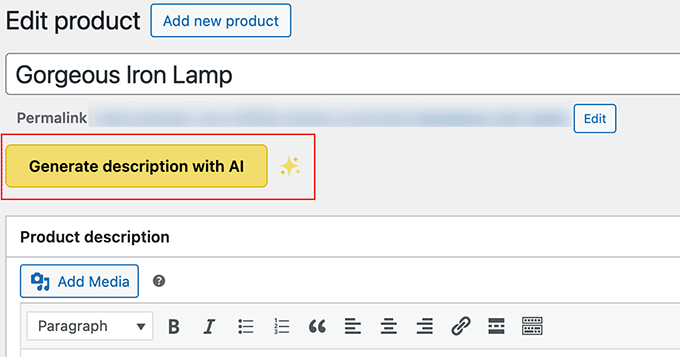

You will also need an attractive and easy-to-navigate online store if you want to get more sales.
If you’re working with WordPress, then you can use SeedProd’s AI builder. Simply provide a short prompt about your niche, and SeedProd will generate stunning landing pages, checkout flows, product pages, and more, all tailored to your eCommerce business.
This is perfect for quickly building high-converting pages without needing to touch a line of code. For details, see our tutorial on how to make a WordPress website with AI.


When it comes to customer support, ChatBot.com allows you to create AI-powered chatbots that guide your visitors throughout the shopping journey.
From answering questions to helping customers during checkout and capturing leads for future marketing, these chatbots are available 24/7 to boost customer satisfaction and sales.
You can also manage your leads and follow-ups more effectively with AI-powered CRM tools like HubSpot.
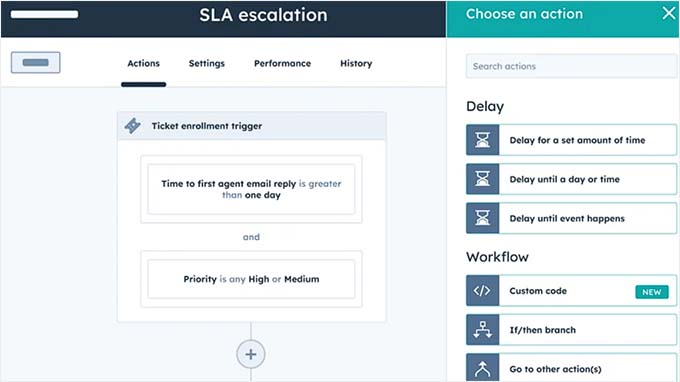

Its AI features track customer interactions, suggest the best time to follow up, and automate personalized emails, helping you close more sales without manual guesswork.
To learn some more tricks, see our article on using AI to skyrocket your lead generation campaign.
4. Using AI for Customer Insights 📈


Understanding your customers is key to growing a successful business. Analytics data can help you learn where your customers come from, how they behave on your website, and the content that they most engage with.
Instead of sorting through complicated analytics reports in the Google Analytics dashboard, I recommend using MonsterInsights with its AI Insights feature to get clear answers from your data.
It works with Google Analytics and gives you summaries, highlights, and smart recommendations directly inside WordPress, without needing to be an analytics expert.
Plus, with the new Conversations AI tool, you can chat directly with your website’s data.
Just ask plain-English questions like ‘How did my product page perform last week?’ or ‘Where are most of my conversions coming from?’ and get instant, human-friendly answers.
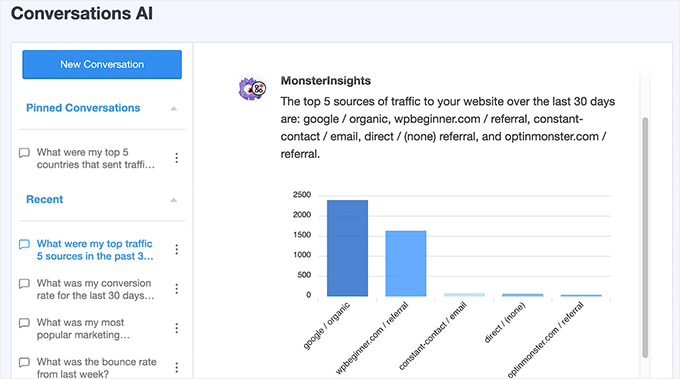

At WPBeginner, we also use MonsterInsights to track website traffic and create our content strategy. For more details, see our MonsterInsights review.
Additionally, you can use ChatGPT to perform sentiment analysis. The tool will analyze your customer reviews, social media comments, and surveys, and tell you how your customers felt when writing the review.
You can then use this information to draft an appropriate response and improve relationships with your visitors and customers.
To find out how to do this, see our guide on the best ways to use OpenAI on your website.
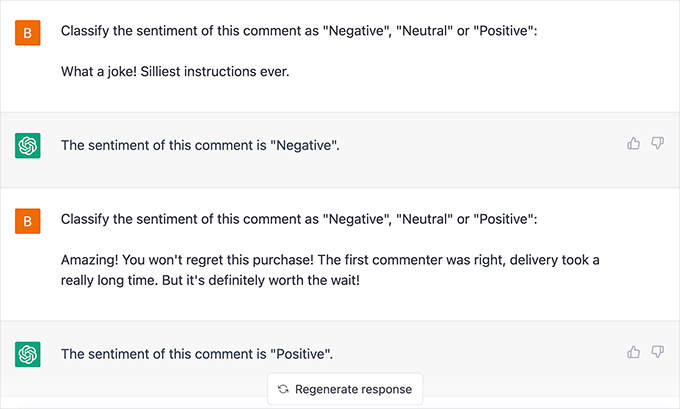

If you have a small business website with WordPress, then you can also install UserFeedback. This powerful user feedback plugin offers AI summaries that analyze responses from your website surveys and turn them into easy-to-read reports.
You’ll be able to see key trends, feature requests, and recurring customer concerns without reading every response manually.
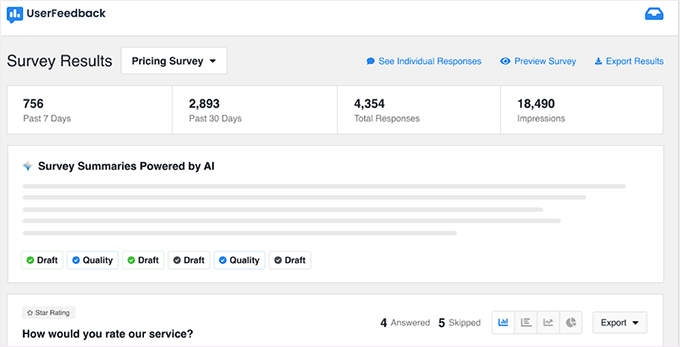

This makes it easier to understand how users feel and what they expect, so you can respond faster and make smarter improvements.
For more details on how it works, just see our complete UserFeedback review.
5. AI for Security & Fraud Prevention 🔒
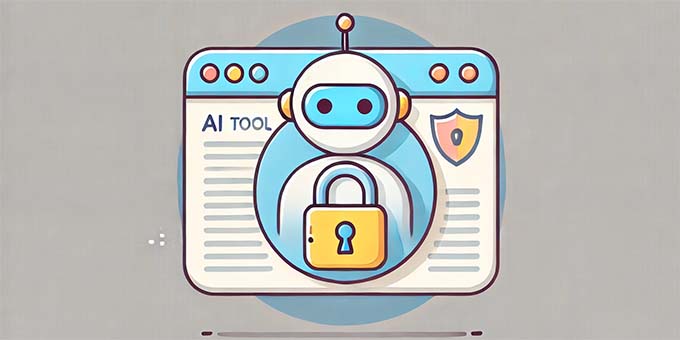

Keeping your business safe online is more important than ever. AI can help you detect threats, prevent fraud, and secure customer data. It works in the background, spotting risks before they become real problems.
For instance, you can use Cloudflare to improve your website security. It utilizes AI to protect sites from cyberattacks, malware, and suspicious activity by monitoring for malicious JavaScript, potential threats, and other anomalies.
At WPBeginner, we use Cloudflare to protect our website, and it has given us great peace of mind. For details, see our article on why we switched from Sucuri to Cloudflare.
You will also need to provide secure payments to protect both you and your customers’ data. The good news is that many reputable payment processors have in-built AI features to safeguard their transactions.
For example, both Stripe Radar and PayPal Fraud Protection use machine learning to detect and prevent suspicious payments. They analyze transactions to detect unusual patterns and stop fraudulent purchases before they go through.
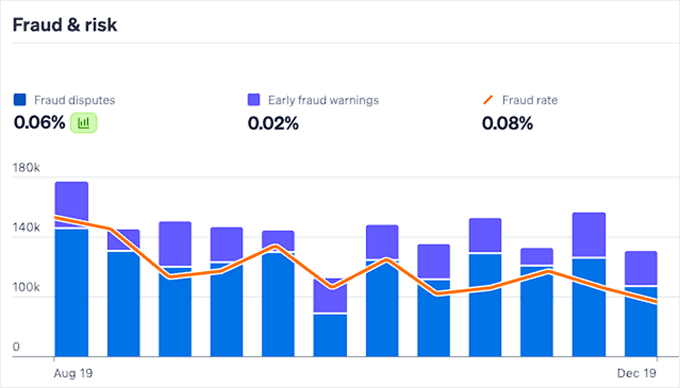

If you’re using WooCommerce or Easy Digital Downloads, then you are in luck because both platforms integrate seamlessly with both Stripe and PayPal.
To find out how to integrate these payment options with your website, see our ultimate WordPress guide on payment processing.
6. Create AI-Powered Automated Workflows 👷
Running a small business often means handling multiple tasks at once. Luckily, AI-powered automation can help you streamline your workflows by handling repetitive tasks automatically.
This lets you focus on growing your business instead of getting caught up in day-to-day operations.
For automated workflows, I recommend using Uncanny Automator. It’s like having an AI-powered digital assistant that connects different tools and automates tasks based on specific triggers.
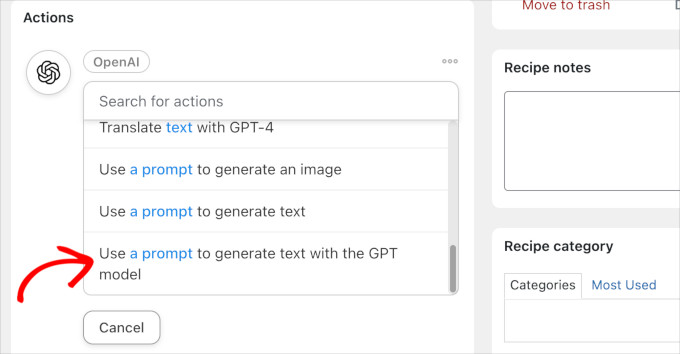

Its OpenAI integration allows you to set up all kinds of automated workflows, such as the ability to:
- Generate content using AI.
- Create social media posts with AI whenever a new post is published on your blog.
- Translate content using AI.
- Send personalized welcome emails when someone subscribes to your newsletter.
- Respond to customer queries using AI.
For full details on how to set this up, please see our guide on how to create automated workflows in WordPress with Uncanny Automator and our list of the best ways to use OpenAI.
Getting Started with AI in Your Small Business
Getting started with AI might seem overwhelming, but you don’t need to be a tech expert to use it. The key is to start small and focus on tools that solve real problems in your business.
Whether that means automating tasks, improving customer service, or boosting sales, AI can help you work smarter, not harder.
Let’s look at some best practices for integrating AI tools into your business:
- Identify Business Pain Points: You need to first look at your business and identify any pain points that AI can solve. Try to find tasks that slow you down, like customer support, content creation, or data analysis. AI can take over repetitive work so you can focus on your business.
- Start With Low-Cost AI Tools: Test budget-friendly AI tools before committing to premium solutions. Many AI tools offer free trials or basic plans, so you can try them before making a big investment to see what fits your needs.
- Test AI tools Before Full Implementation: Don’t automate everything at once. Start by using AI for specific tasks, like creating content or responding to FAQs, and you can expand as you see results.
- Balance Automation With a Human Touch: When using AI for customer support, make sure that your customers can easily contact an agent if they want. I recommend using AI to assist and not to replace genuine engagement.
- Regularly Review AI Performance: AI tools improve over time, but they do need monitoring. Check your results, tweak settings, and make sure AI is helping not hurting, your workflow.
By following these best practices, you will make AI work for your business without feeling overwhelmed. The next step is choosing the right AI tools that fit your needs and help you grow.
Finding the Right AI Tools for Your Business
With so many AI tools available, it can be tough to narrow down the ones you may actually need to grow your small business. Whether you need help with content, marketing, or customer service, there are some great options:
- ChatGPT: Perfect for answering customer questions, generating content ideas, and writing emails. Many small businesses also use it for chatbot automation and quick content creation.
- Jasper AI: Great for writing blog posts, email campaigns, and social media captions. It helps businesses create high-quality content faster and with less effort.
- Canva AI: Makes designing visuals easy with AI-powered templates and image generation. A great tool for social media graphics, ads, and branding.
- Gemini: Google’s AI assistant for content creation, research, and brainstorming. Helpful for businesses looking for AI-powered insights and writing assistance.
I recommend starting small by choosing one or two AI tools that match your current business goals. As you begin to see results, you can gradually add more to your workflow.
Want more options to explore? Check out our curated list of the best ChatGPT alternatives for bloggers and marketers.
The Best AI-Powered WordPress Plugins for Your Business
AI tools can help with content creation, marketing, and automation, but AI plugins bring these benefits directly into your WordPress site.
Instead of switching between multiple platforms, you can use AI within WordPress to optimize SEO, generate leads, and improve customer engagement.
Here are some top AI plugins that can make running your site easier and more effective:
- AIOSEO – Uses AI to optimize your website for search engines, helping you rank higher and attract more visitors.
- SeedProd – An AI-powered landing page builder. Simply provide a prompt, and it can generate an entire website layout for you using ChatGPT.
- WPForms – Features an AI form builder that can generate entire forms based on the prompt you provide.
- MonsterInsights – Integrates with Google Analytics and uses AI to provide insights into website traffic and visitor behavior.
- OptinMonster – Uses AI to improve popup targeting, exit-intent campaigns, and personalized marketing for better conversions.
- Uncanny Automator – Lets you create automated workflows and connect ChatGPT with third-party plugins and tools.
- Thrive Ovation – Uses AI to display positive testimonials across your social channels.
For more options, see our expert pick of the best WordPress ChatGPT plugins.
Final Thoughts: Avoiding Common Mistakes by Using AI the Right Way
AI is an amazing tool, but it works best when you are in control. Think of it as a helpful assistant who can help you save time, boost efficiency, and even spark new ideas, but it still needs your guidance.
One of the biggest mistakes business owners make is trusting AI without double-checking. Instead, you should use AI to support your decisions, not replace them.
You must remember that AI-generated content, whether it’s a blog post, an email, or a customer response, isn’t always perfect. Take a moment to review and tweak what it creates. Maybe it needs a little polish, a personal touch, or just a quick fact check.
Similarly, if you’re automating tasks, keep an eye on how things are running and make adjustments as needed.
Frequently Asked Questions About Using AI
Here are some questions that are frequently asked by our readers about using AI for small businesses.
Is AI expensive for small businesses to get started with?
Not necessarily! A lot of AI tools are actually quite affordable and some even offer free plans.
If you use AI to automate repetitive tasks or speed up your workflow, it can save you both time and money in the long run. The best approach is to start small, experiment with a few tools, and scale up as you see results.
Do I need technical expertise to add AI in my business?
While having technical knowledge can be beneficial, you don’t actually need it to use AI in your business.
Many AI solutions like ChatGPT are designed with user-friendly interfaces, allowing business owners without a technical background to integrate and utilize them effectively.
Additionally, resources and support services are available to guide you.
Is it safe to use AI for customer data?
Yes, AI can be safe for customer data, as long as you use the right tools and practices. Many AI platforms follow privacy standards like GDPR, which helps ensure customer data is protected.
However, I recommend that you be transparent with your customers about what data you’re collecting and how it’s being used to build trust.
It’s also important to review the privacy policies of the AI tools you’re using to ensure compliance with relevant regulations. Always collect only the data you need and take extra steps, such as encrypting sensitive information, to protect your customers’ privacy.
For more details, see our complete guide to GDPR compliance.
Related Guides to AI and Small Businesses
If you liked this article, then please subscribe to our YouTube Channel for WordPress video tutorials. You can also find us on Twitter and Facebook.
این خبر را در ایران وب سازان مرجع وب و فناوری دنبال کنید
جهت ادامه مقاله اینجا را کلیک نمایید
ایران وب سازان مرجع وب و فناوری